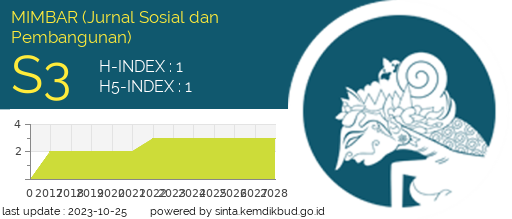Stakeholder Collaboration in the Development of Essential Ecosystem Area
DOI:
https://doi.org/10.29313/mimbar.v39i1.2065Keywords:
Collaboration, Stakeholder, Mangrove, Ujung Pangkah, GresikAbstract
Abstract. This study aims to analyze the process of collaborative governance in the development of the Ujungpangkah Mangrove (MUP) Essential Ecosystem Area (KEE) in Gresik Regency, East Java which has been established by the Governor of East Java in 2020. Collaboration between government and non-government is seen from the aspect of their respective roles each stakeholder, common understanding and goals, clarity of roles and responsibilities of each party, commitment of stakeholders in carrying out roles and responsibilities, reciprocal relationships and dependencies as well as potential conflicts and efforts made to resolve these conflicts for the sustainability of KEE-MUP as an ecotourism destination. This research uses a qualitative method with a case study approach. The results show that the dynamics of collaborative governance are not good, this can be seen from the unclear understanding and common goals among stakeholders. The collaboration scheme carried out by the government to build trust and commitment in the development of KEE must be carried out so that the roles of each stakeholder are clearly known. With these facts, common perceptions between stakeholders are needed as well as arrangements for rights and obligations in effective management, each stakeholder must bear the costs of managing KEE which is his responsibility, and is entitled to benefit from managing KEE through activities that are legally justified. As well as a partnership mechanism between stakeholders in the management of KEE, the mechanism for sharing costs and benefits must be regulated in a transparent, fair and fulfilling the principle of equality.
References
Agranoff, R., & McGuire, M. (2003). Collaborative public management: New strategies for local governments. Georgetown University Press.
Ansell, C., & Gash, A. (2008). Collaborative governance in theory and practice. Journal of Public Administration Research and Theory, 18(4), 543–571. https://doi.org/10.1093/jopart/mum032
Chowdhury, R. R., Uchida, E., Chen, L., Osorio, V., & Yoder, L. (2017). Anthropogenic drivers of mangrove loss: Geographic patterns and implications for livelihoods. In Mangrove Ecosystems: A Global Biogeographic Perspective: Structure, Function, and Services (pp. 275–300). https://doi.org/10.1007/978-3-319-62206-4_9
Creswell, J. W. (2015). Penelitian Kualitatif & Desain Riset : Memilih di antara Lima Pendekatan. Pustaka Pelajar.
Dahrendorf, R. (1986). Konflik dan Konflik dalam Masyarakat Industri Sebuah Analisis Kritis. Dahrendorf, R.
Doberstein, C. (2016). Designing Collaborative Governance Decision-Making in Search of a ‘Collaborative Advantage.’ Public Management Review, 18(6), 819–841. https://doi.org/10.1080/14719037.2015.1045019
Emerson, K., Nabatchi, T., & Balogh, S. (2012). An integrative framework for collaborative governance. Journal of Public Administration Research and Theory, 22(1), 1–29. https://doi.org/10.1093/jopart/mur011
Hardin, G. (1968). The Tragedy of the Commons. Science, 162(3859), 1243–1248.
Huda, S., Farikhah, F., Auliya, P. K., Maknun, C. L., & Rochmah, N. (2022). Urgensi Pendidikan Ekologi melalui Muatan Lokal untuk Mendukung Tercapainya Penetapan Status Kawasan Ekosistem Esensial (KEE) Mangrove Ujungpangkah. PengabdianMu: Jurnal Ilmiah Pengabdian Kepada Masyarakat, 7(Special-1), 217–223. https://doi.org/10.33084/pengabdianmu.v7ispecial-1.2508
Johnston, E. (2010). Governance infrastructures in 2020. Public Administration Review, 70(SUPPL. 1), 122–128. https://doi.org/10.1111/j.1540-6210.2009.02116.x
Joo Chang, H. (2009). Collaborative governance in welfare service delivery: Focusing on local welfare system in korea. International Review of Public Administration, 13(October), 75–90. https://doi.org/10.1080/12294659.2009.10805141
Lubis, L., & Wahyudi, A. (2019). The Implementation of Mangrove Policy on the East Coast of Surabaya. 1st International Conference on Innovation in Research (ICIIR 2018), 88(65), 150–154. https://doi.org/10.2991/icosihess-19.2019.39
Morse, R. S., & Stephens, J. B. (2012). Teaching Collaborative Governance: Phases, Competencies, and Case-Based Learning. Journal of Public Affairs Education, 18(3), 565–583. https://doi.org/10.1080/15236803.2012.12001700
Prayitno, D. E. (2020). Kemitraan Konservasi Sebagai Upaya Penyelesaian Konflik Tenurial dalam Pengelolaan Kawasan Konservasi di Indonesia. Jurnal Hukum Lingkungan Indonesia, 6(2), 184–209. https://doi.org/10.38011/JHLI.V6I2.175
Roberts, D., Wyk, R. van, & Dhanpat, N. (2016). Exploring practices for effective collaboration. Annual Conference of the Southern African Institute of Management Scientists, September, 4–7. http://mediachef.co.za/saims-2016/papers/HRL1_Full.pdf
Thomson, A. M., & Perry, J. L. (2006). Collaboration Processes : Inside the Black Box. Public Administration Review, December.
Umiyati, S., & Tamrin, M. H. (2020). Collaboration Of Stakeholders In The Development Of Halal Tourism In Malang City Of East Java Indonesia In Technology Era 4.0. Systematic Reviews in Pharmacy, 11(2), 807–813.
Waardenburg, M., Groenleer, M., de Jong, J., & Keijser, B. (2020). Paradoxes of collaborative governance: investigating the real-life dynamics of multi-agency collaborations using a quasi-experimental action-research approach. Public Management Review, 22(3), 386–407. https://doi.org/10.1080/14719037.2019.1599056
Yin, R. K. (2008). Studi kasus desain dan metode. Raja Grafindo Persada.














